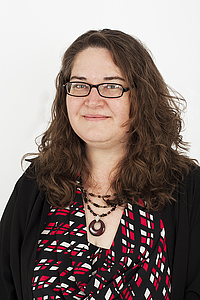Destiny Crider

Manager of the Anthropology Lab and Collections
Museum Studies Program Director
About
Destiny Crider is the Manager of the Anthropology Lab and Collections and Instructor in the Museum Studies Department.
Dr. Crider offers museum studies courses every other year. The upcoming schedule of courses are:
- MUST 120 Introduction to Museum Studies in Fall of 2017
- MUST 220 Collections Management in Spring 2018
She has also taught Directed Reading Topics in Anthropology focused on the “Worldview of the Central Mexican Aztecs,” and “Introduction to the Archaeology of the Southwest.”
Dr. Crider maintains a Digital Library of Central Mexican pottery that features her research and those of archaeological specialists in the Basin of Mexico.
Dr. Crider recently conducted a collaborative research project with Professor Benjamin Moore and Anthropology/Art student Jayne Cole (’14). The research resulted in two conference presentation:
- Crider, Destiny (2014) Crossing the Lines: Approaches to the study of Mazapan Wavy Line Pottery from Central Mexico. Invited Symposium “Recreating Mesoamerica: Explorations in Experimentation, Innovation, and Interdisciplinary Research”, Breaking Barriers: 47th Annual Chacmool Archaeology Conference , University of Calgary, November 7-9.
- Crider, Destiny, Ben Moore, Jayne Cole 2014 Experimentation in Ceramic Decorative Technology: The Central Mexican Multi-Prong Brush. Poster Session Mesoamerican Archaeology, Society for American Archaeology 79th Annual Meeting, April 23-27, Austin.
Dr. Crider’s research interests includes archaeology of the Americas with particular specialty Mesoamerica and US Southwest. She is a specialist in ceramic and materials analysis, with a recent interest in replicating some aspects in ceramic decorative technologies, and she has authored and co-authored several studies:
- Stoner, Wesley D., Deborah L. Nichols, Bridget A. Alex, Destiny L. Crider (2015) The Emergence of Early-Middle Formative Exchange Patterns in Mesoamerica: A View from Altica in the Teotihuacan Valley. Journal of Anthropological Archaeology 39 (September):19-35
- Crider, Destiny (2013) Shifting Alliances: Epiclassic and Early Postclassic Interactions at Cerro Portezuelo. Ancient Mesoamerica (24):107-130.
- Crider, Destiny (2013) Assessing Mexican pottery paint recipes using particle-induced X-ray emission. Open Journal of Archaeometry, Volume 1:e5: 20-25.
- Simon, Arleyn W., Destiny Crider, Tatsuya Murakami, Barry Wilkens (2013) Arizona Salado Turquoise: source studies with PIXE and XRD. Open Journal of Archaeometry , Volume 1:e10:49-53.
- Crider, Destiny (2011) Epiclassic and Early Postclassic Interaction in Central Mexico as Evidenced Through Decorated Pottery. PhD dissertation, School of Human Evolution and Social Change, Arizona State University.
- Crider, Destiny, Deborah L. Nichols, Hector Neff, Michael D. Glascock (2007) In the Aftermath of Teotihuacan: Epiclassic Pottery Production and Distribution in the Teotihuacan Valley, Mexico. Latin American Antiquity 18(2):123-144.
- Nelson, Ben, and Destiny Crider (2005) “Posibles Pasajes Migratorios en el Norte de México y el Suroeste de Los Estados Unidos Durante el Epiclásico y el Postclásico.” In Reacomodos demográficos del
MUST 120: Introduction to Museums
The history of museums, archives, and collections and the nature and variety of museum work in contemporary society. An introduction to museum organization; museological theory and philosophy; concepts of museum exhibition and interpretation. Explores how collections and objects can be used as sources of meaning and information, and how museums and numerous other institutions can be used as educational resources. Workshops with Luther College Collections and Archives staff, as well as case studies at the Vesterheim Norwegian-American Museum.
MUST 220: Collections Management
Addresses specific topics of curatorship and management of collections, including: acquisition practices; legal and ethical issues; collections organization, conservation, and preservation; and data collection, organization, and management. The course will emphasize practices and technology that will ensure the continued potential and relevance of objects in the pursuit of knowledge and enjoyment of science, art, and nature.
- Ph.D., Arizona State University, Anthropology
- B.A., University of Kansas, Anthropology